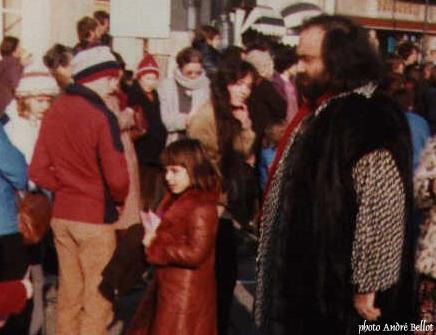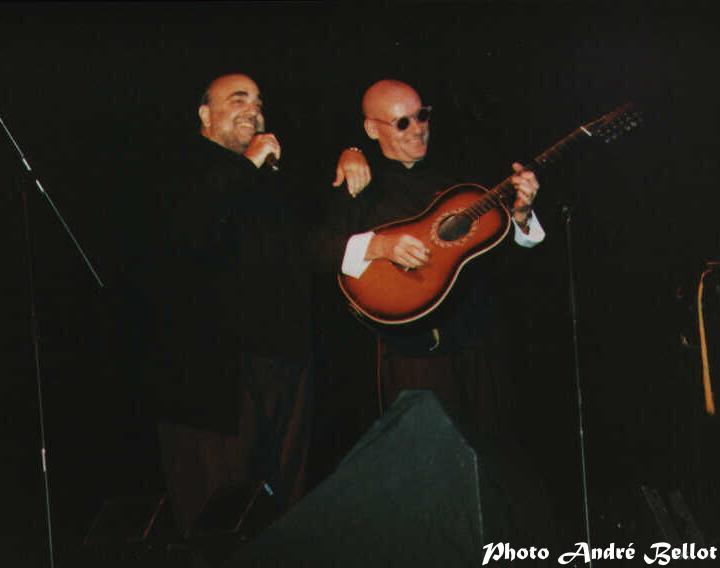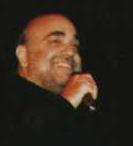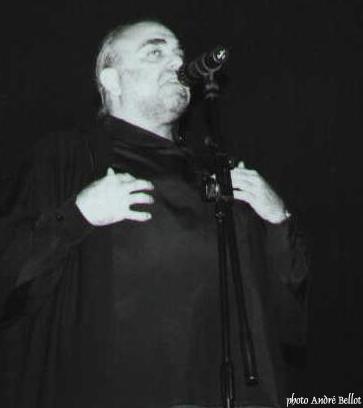
Demis Roussos Biography
The
Roussos had been in Egypt for two generations and on 15 June 1946 Artemios Venturis Roussos was born in Alexandria. His mother, Olga, and his father, George, both of Greek extraction, had also been born in the country their
parents had come to in the 1920s. Following the Greek custom, the baby was named after his paternal grandfather, Demis being a pet name for Artemios. In the heart of an orthodox community, he lived in the middle of a Muslim city. From his early childhood he was immersed in folk music, exposed to Byzantine and Arabic influences. Attracted to singing, he joined the choir of the Greek Byzantine Church with which he sang for five years as a soloist. At the same
time he studied musical theory and learnt how to play the guitar and the trumpet.
Everything was going well when the Suez crisis blew up in 1961. Residents in Egypt had to leave the country and the Roussos – Mr Roussos was an engineer with a property construction company – returned to their native land, Greece.
At the age of 17, with only music in his head and to the great disappointment of his mother who was hoping to send him to the best school in Athens, Demis formed his first band, ‘The Idols’, in which he played guitar and bass. At that
time the band members were his cousin Jo, Natis Lalaitis, Nikos Tsiloyan and Anthony. A chance happening meant that one day Demis had to replace the group’s singer for a short time and he sang an Afro-American spiritual, ‘The
house of the rising sun’, and another popular success of the time, ‘When a man loves a woman’. The public was immediately won over by his voice. Overcome by a great desire for independence, he began to feel the need to take control of his own life. Henceforth, bands and clubs became part of his daily life. Meeting Lucas Sideras and Argyris Koulouris lead him to play the international successes of the moment in clubs and night- clubs. The great turning point of his musical career was his meeting with Vangelis Papathanassiou in the summer of 1966. One particular song introduced Vangelis to demis’ unique voice. Within his group he began to sing more and more often, frequently as a soloist. However, a few meetings with Vangelis did take place. These young musicians, cut off from the international music scene, soon realised that an interesting career could only be accomplished outside their country.

APHRODITE’S CHILD
Demis
left his group and began to practice new songs with Vangelis. At the end of
March 1968, Lucas and Demis took the train to London. Vangelis was supposed to
join them a few days later. Fate decided otherwise. When they arrived in Dover,
at the English border, with no work permits, customs officers discovered photos
and tapes in their luggage and quickly realised what their true intentions were.
The young musicians cut short their journey. Back in Paris, trapped by the
circumstances, their savings melted away day by day. Unable to leave Paris where
unrest was brewing, only a recording could get them out of a tight spot. They
learnt that Phonogram was holding an international conference and, plucking up
all the courage they could find, they went to meet with the executives and
explained their situation. A draconian contract, which promised exclusivity for
six years, was drawn up. Confronted by the necessity to get by, they signed the
contract and were able to begin recording. Their dream was at last coming true.
It was in the 4m² cellar near the Porte d’Italie where they practised that
‘Rain and tears’, composed by Vangelis, was born. The lyrics were written by
Boris Bergman, a young song-write introduced to them by the record company. The
recording of the single took place in extremis in rather unusual circumstances.
The following day the studio closed due to the general strike. A few weeks later
‘Rain and Tears’ was number one in the charts. They had made a hit! They
themselves saw very little difference in what they were doing but they began to
receive proposals for concerts and they were swept up in success. In June a week
of performing at Olympia as Sylvie Vartan’s opening act was a real success.
They spent the summer in the clubs of the South of France. Their success
continued to grow. Hundreds of thousands of copies of their first album were
sold and demis’ fantastic voice brought them a great many more successes with
‘It’s five o’clock’, ‘I want to live’, ‘End of the world’ and
‘Spring, summer, winter and fall’. These five hit singles were accompanied
by two albums, one of which became number one. The group climbed to number one
in Germany, Holland, Belgium, France and Italy… ‘Aphrodite’s Child’
lasted for two years. They made 239 television appearances over this period.
Demis married Monique with whom he had a daughter, Emilie. Vangelis however was
dissatisfied. He wanted a more serious music, more like the music he composed
alone. He wished to confront the English and American markets, to stop touring
and devote his time to studio work. The recording of the double album ‘666’,
based on the texts of Saint John’s Apocalypse, was the materialisation of this
desire for change. It was a critical moment for the group: after three months of
costly recording, the record company panicked. The break-up of the group became
inevitable after a heated argument between Vangelis and Lucas. In the end it was
Vangelis alone who, one year later, finished the album which was seen at the
time as a classical masterpiece. Supported by the record company Phonogram,
Demis began a solo career.

Demis Roussos GOES SOLO
Inspired
by the numerous folk themes in his head and using the sounds and instruments of
pop music Demis fulfilled his dream. Two months in the studio were required to
complete this first LP. He composed some of the melodies and conceived some of
the arrangements. Named ‘Fire and Ice’, love, life and death are its major
components. This twelve track album was released in 1971. Demis was already no
longer totally unknown, his first single, ‘We shall dance’, having been one
of the biggest hits of summer 1971 not only in France, but all over Europe. His
international career took off straightaway. 1972 was a year of travelling. Spain,
Italy, the Netherlands, Greece and Germany welcomed him. In June ‘My Reason’
was released and for several weeks Demis was once again at the top of the
singles’ charts in France. In September he achieved national consecration with
a performance at Olympia that revealed his talent. His vocal potential was
fantastic and his stage presence extraordinary. In front of 30 000 people he
performed ‘Velvet Morning’, a song composed specially for the occasion by
Lakis Vlavianos, a Greek born in Athens on 7 July 1947. He composed most of
demis’ songs, ‘My friend the wind’, ‘Someday, somewhere’…
Accompanist and conductor, he played the organ, Melotron and Moog Synthesizer. A
trip to South America lead to a big tour in 1973, the year which saw the release
of his second album, ‘Forever and ever’ comprising songs that would nearly
all become great hits just like ‘Forever and ever’, ‘My friend the wind’,
‘Lovely sunny days’, ‘My reason’, ‘When I was a kid’, ‘Goodbye my
love, goodbye’… Two million records had already been sold in one year of
solo career and the Demis Roussos phenomenon was only just beginning. That year
I heard a lot about him on the radio and I often listened to old Aphrodite’s
Child records and to my great surprise I learnt that he was going to give a
recital in my home town as the opening act for Joe Dassin. That was my first
meeting with Demis. Until then I had never seen him on stage but he was in my
imagination, omnipresent, all-powerful. His entrance was announced by an
instrumental from his orchestra, a mixture of Wagnerian and Byzantine music
added to by an impressive sound system. Demis appeared on stage. His stature was
impressive, his long tousled beard flowing like a prophet’s, lightning in his
eyes, his smile confident and satisfied. Demis, the Pope of pop, with the
physique, the majestic gestures, the lofty allure, appeared shrouded in a cloud
of smoke. That night he mixed a harmonious cocktail of both Greek and Byzantine
music with sublime nuances. Steeped in this music, the public was captivated by
his technical perfection. Demis Roussos had a musical style without
improvisation, full of finesse and beauty. On stage the colours were perfectly
matched to the music: tender, gentle, nothing aggressive. One of the songs, the
unknown ‘Thousand years of wondering’, lasted six minutes. Composed by Lakis
Vlavianos, it fluctuated between Bach, Led Zeppelin and the Yardbirds. This
fantastic recital ended with a journey through Greece with ‘My reason’. His
music moved the public, stirring in peoples’ hearts the strange charm procured
by religious chants and the aggressive rhythm of Arabic chants. People let
themselves be overcome by his extraordinary voice. It was at that moment that I
personally became a ...
Fan of Demis
Acquiring here and there all the records already released, from this point in time I
collected all the documentation I could about Demis and in this way I learnt a
great deal despite being puzzled by certain articles! In 1973 I attempted to
visit him in Neuilly-sur-Seine where he had an apartment. Unfortunately he was
away and I later learnt that, in fact, he only spent a few nights there each
year. During the same year, I had the chance to meet him at a gala, to be
present at the sound rehearsal and to get an autograph. It was my first real
meeting with Demis Roussos. 1974 saw Demis triumph in Germany, release his new
album, ‘My only fascination’, and start up his own newspaper, Demis
Roussos News, intended for his friends all around the world. This first
review was a chance for Demis to take stock of the last three years of his
career spent as a solo artist. We learn that in 1000 days he gave 380 concerts
in 18 countries, flew 400 000 km by plane, travelled 100 000 km by car, took
part in 120 television programmes, in 180 radio programmes, in three singing
festivals, in M.I.D.E.M. ’73, recorded 40 songs, including 3 albums requiring
600 hours of studio time, received 15 gold discs and sold nearly 9 million
records…In their private life, the Roussos wanted to create a real home. They
bought a house in Maisons-Laffitte, just outside Paris. Wishing to add his
personal touch, Demis ended up having everything renovated. The specialised
press got hold of the story. After two years redecoration, the house was at last
ready. It was a superb dwelling, all white in 1930’s style inspired by
American colonial houses. On the programme for 1975 were five 45 day tours on
five continents. The rest of his time was devoted to preparing a double album
which he had been thinking about for over a year. It was a two hour show, the
first part with famous songs such as ‘My Reason’, ‘Forever and ever’ and
‘Goodbye my love, goodbye’ and the second part inspired by Homer. Certain
musical passages were composed by Manos Hadjidakis and the lyrics were written
all in English by several different authors, including Constandinos and Boris
Bergman. Unfortunately, this work, which should have been released on LP, never
saw the light of day. 1975 was also a year marked by a happy event. On Monday 15
September 1975 the little boy so long awaited by Demis and his wife Dominique
was born at 3:35 in the morning. The proud father saw in Cyril the continuation
of the Roussos’ name. The album ‘Souvenirs’ was released in France
followed in 1976 by ‘Happy to be’. 1976 was also the year that Demis toured
England and released the LP ‘The Roussos Phenomenon’ followed in 1977 by his
first album in French, ‘Ainsi soit-il’. In 1977 the album ‘demis Roussos
Magic’ was also released in France. More than 30 million records had already
been sold worldwide. However, keeping up a palace from which he rarely benefited,
Demis decided to go to Monaco and his family moved there that same year. On 5
December he began several days of recitals at the Olympia Stadium in Paris. 1978
saw the release of the album entitled ‘demis Roussos’ which was recorded in
America. In June 1979 the Roussos settled near Malibu where they rented a
magnificent villa by the sea. The album ‘Universum’, recorded in French,
German, Italian, Spanish, was released and became extremely successful in Latin
America.
A
new album, ‘Man of the world’, was released on 19 May 1980 and took Demis to
the top of the charts. It included his new single, ‘Lost in love’, which had
been released in England and the Netherlands, and also ‘I need you’,
released as a single in France, Italy and Spain. This new album included songs
from Barry Mann, Harry Nilsson, Francis Rossi and several other artists from the
world of pop. The songs were a success. ‘Lost in love’ was successful in
England, the Netherlands and Belgium. ‘Sorry’ was also a hit in England, as
was ‘I need you’ in France, Italy and Spain. ‘San Pedro’s Children’,
with ‘Sorry’ on the B-side, was released in Germany after ‘Lost in
love’. The album ‘Man of the world’ came out in four different versions.
Side 1 of the French version comprising ‘Man of the world’, ‘Slacham dance’,
‘Lost in love’, ‘Miss you nights’, ‘Little girl’, ‘I need you’,
‘I’d give my life’. Side 2 comprising ‘Sorry’, ‘Had to run’,
‘San Pedros children’, ‘The wedding song’, ‘Love is away’,
‘We’re over’. In England, idem except that on side 2 ‘How glad I arn yoy
oem’ replaces ‘Had to run’. In Spain ‘Sonora’, the Spanish version of
‘I need you’, is to be found on side 1 and ‘Cançion de boda’ instead of
‘Wedding song’ on side 2. In Italy ‘Credo’ replaces ‘I need you’ on
side 1 and ‘Nascera’ (‘Highway home’) replaces ‘Had to run’ on side
2. Released in almost every country in the world, the album was produced by
David McKay.

A NEW LOOK
In
June 1980 Demis weighed in at 147kg. Stop! He had already tried a diet in 1979
in an attempt to lose weight. At last he found the one that suited him best. In
June 1980 he began his diet in earnest. The result surprised more than a few. In
ten months he lost 50kg. Meanwhile, in September he gave a few galas in England
in the clubs around London followed by a tour in Argentina in October. In Italy
he was awarded a gold disc after selling 150 000 copies of his album
‘Universum’. At the end of February 1981, Demis was in France. He took part
in the ‘Marché International du Disque et de l’Edition Musicale’ in
Cannes and appeared in a special televised show, ‘Le Palmarès des
chansons’, during which he sang ‘Forever and ever’, ‘My reason’ and
numerous other older titles. He concluded with his latest single, ‘Si j’étais
roi de la Terre’, produced by Alec Constandinos. In Rouen he participated in
an RTL radio show with Michel Drucker. A new single, ‘Race to the end’, was
released. It was composed, arranged and produced by Vangelis Papathanassiou
using texts by Jon Anderson. It is a vocal adaptation of the film ‘Chariots of
fire’. It was released in England on 16 March 1981 but the rest of the world
had to wait until the end of March or April. The new album, ‘Race to the
end’, was recorded in May and June 1981 and produced in August. With Vangelis,
Demis recorded the French version of ‘Race to the end’ and another song
which he would produce in France. After a tour of Australia, from 17 June to 16
July 1981, he began a new grand tour of Europe from 16 November to 15 December
1981 with 27 concerts, six in England, the others in Holland, Belgium, France
and Switzerland. In France, the French version of the single ‘Race to the
end’, entitled ‘La course infinie’, was released as was a Spanish version,
‘Es tu libertad’. Véronique Skawinska, a friend of Demis, wrote a book
about the diet he had undertaken. It was published in autumn 1981. In August
1981, Demis took advantage of his holidays to prepare for working on a new album
in September and October 1981. In November 1981, Vicky Leandros recorded a duet
album with singers such as Johnny Halliday, David Soul and Demis. This duet with
his his fellow countrywoman came out as a single in December in Holland and
Switzerland. Produced in March 1982, ‘demis’, a new album in a new musical
style reflecting demis’ altered image, appeared in England, Holland, Germany
and numerous other countries around the world. It was comprised of the following
titles: ‘Lament’, ‘We’re shining’, ‘Take me sailing’, ‘Song
without end’, ‘For the free’, ‘Gypsy lady’, ‘Need to forget’,
‘Race to the end’ and ‘Where are they now’. It came out in France, Italy,
and Spain with tracks sung in the language of each country. For France,
‘Lament’ became ‘Au nom de l’amitié’, ‘Song without end’ became
‘Ma chanson qui n’en finit pas’, ‘For the free’ became ‘Les enfants
du futur’, ‘Race to the end’ became ‘La course infinie’ and ‘Where
are they now?’ became ‘Où est ce temps?’ For Italy, ‘For the free’
became ‘Ese tu’ and ‘Need to forget’ became ‘Impossible dimenticarti’.
For Spain, ‘Take me sailing’ became ‘Una isla an el cielo’, ‘For the
free’ became ‘En el nombre de I’amistad’, ‘Need to forget’ became
‘Nessecito Olvidar’ and ‘Race to the end’ became ‘Es tu libertad’. A
single was released under the title ‘Lament’. As he had to do numerous
television and radio shows to promote his record, Demis decided to move to
England where he rented an apartment for six months. In the autumn of 1982 a
single, ‘Follow me’, and an album, ‘Attitudes’, were released in France.
The European version, released at the end of October or the beginning of
November, comprised the following tracks: ‘Follow me’ (long version composed
to the second movement of Rodrigo's Concerto de Aranjuez), ‘Pretender’,
‘Planet Earth is blue’, ‘Deepest of all’, ‘Take my hand’, ‘Flaming
star’, ‘House of the rising son’. For the English version, ‘Take my
hand’ was replaced by a newly remixed version of ‘Lament’. ‘Flaming
star’ was also replaced by ‘Race to the end’. An international single,
‘Follow me’ and ‘Song without an end’, was also produced. In 1983 the
single ‘Jay’ was released, followed in 1984 by ‘Reflections’, an album
produced by his friend Vangelis. It was a collection of well-known songs from
numerous different artists. 1985 saw the release of another single, ‘Amis pour
la vie’. This was the year in which an exceptional event was to leave a deep
and lasting mark on Demis. On June 14 he was the victim of a plane hijacking
when he was travelling with his wife Pamela. Shocked by this traumatising
experience and having brushed with death, Demis realised just how precious and
beautiful life is. He decided to work towards making the world a better place
through what he knew best, his music. He planned to start recording again and to
appear on stage. In 1986 he released a single, ‘Island of love’, followed in
1987 by another, ‘Quand je t’aime’. The album entitled ‘Le Grec’ and
dedicated to his mother was released in 1988. Demis composed two of the tracks,
‘The beauty of your eyes’ and ‘Futureless forever’. ‘Voice and
vision’, an album from which the track ‘On écrit sur les murs’ was also
released as a single, came out in December 1989.

TOWARDS THE NEW MILLENIUM
Two singles came out in 1990, ‘Poésie’ and ‘Même si’. The album
‘Christmas’, recorded at the beginning of the nineties is still considered
as the best selling collection of classical Christmas songs. Tours were
organised in a number of French churches, home of these timeless songs.
‘Insight’, album on which, amongst other things, we find the poem
‘Spleen’ from Charles Baudelaire’s work ‘Les fleurs du mal’, was
released in 1993. Demis is accompanied on this track by Ronnie. The symphonic
album ‘In Holland’ and the album ‘Immortel’ were released in 1995. The
latter is a collection of quintessential popular French songs such as ‘Les
Moulins de mon coeur’ by Michel Legrand, ‘La mer’ and «Que reste-t-il de
nos amours?’ by Charles Trénet, ‘Les feuilles mortes’ by Prévert, ‘La
vie en rose’ and ‘L’hymne à l’amour’ by Edith Piaf. ‘Serenade’
came out in 1996. It is a collection of classical western opera pieces. A new
CD, ‘Mon île’, composed of different ethnic music, was released in 1997.
The most famous track remains ‘Dinata’. ‘The phenomenon’, a four CD
collection, was released in 1998 and covers the thirty years of Demis Roussos’
career. It includes a song from his early days, ‘Thousand years of wondering’,
and also a short rock opera inspired by Homer already planned in 1975. A DVD was
also produced. It includes photos and enables us to discover the
‘Aphrodite’s Child’ era, to hear a moving interpretation of ‘Race to the
end’ and to enjoy ‘On écrit sur les murs’ where Demis plays the bass. A
new CD, recorded in German, ‘Auf Meinen Wegen’, English and Italian, was
produced and released in 2000.
JUNE 2001
Universal has released a 20 track compilation. This luxurious object includes a biography derived from this site and illustrated with numerous photos.




